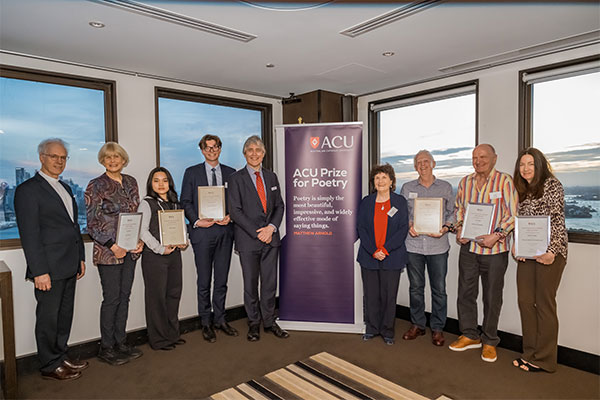A former corporate law lecturer has taken out the 2025 ACU Prize for Poetry.
Award-winning legal and creative writer Roger Vickery has claimed one of Australia’s richest prizes for a single poem, winning $10,000 for his deeply personal history of New South Wales’ most famous gold mining area, Araluen.
In his poem, ‘Our Greater Souls’ — which responded to the Prize’s theme of ‘Belonging’ — Vickery compares his own experience of living in Araluen with that of colonial poet, Charles Harpur, who in 1858 was made gold commissioner of the southern goldfields.
Where Harpur lamented the environmental destruction and the violence against local Aboriginal people, Vickery also recalls the “good and terrible things that happened to us there”.
“We’ve lived through fire and deaths and loss and some wonderful times and yet always there is a sadness about the land, about the environmental damage and the sense of a lost people, so it’s a haunted place,” Vickery said.
“That poem helped me get in touch with my own hauntings and the bigger hauntings around that land. It’s an immensely powerful place for me. It’s a very honest poem, more honest than I’d like some of my family to hear, so it’s a very authentic poem.”

The poem also wrestles with persistent doubts that his family’s collective torment and trauma is “miniscule” when compared with the loss felt by Araluen’s traditional owners, the Walbunja people of the Yuin nation.
“I have strong family associations there, yet it’s stolen First Nations land. How do you claim you’ve got a connection there and yet match the association of the indigenous people there?” Vickery said.
ACU Prize for Poetry judges Professor Robert H. F. Carver and Emeritus Professor Margot Hillel OAM said this year’s competition attracted more than 500 entries, including mother-and-son Sarah Tiffen and Wilbur Nelson and a record 11 poems by Jo Gardiner, who will be featured in the published Anthology.
“Many of the finest poems in this collection address, directly or obliquely, some of the most challenging questions of our times: ‘Who belongs where?’ and ‘What belongs to whom?’ How do we weigh current political and demographic realities against the claims of history (whether ancient or modern)?” the judges’ report said.
“Does precedence in time confer permanent or exclusive rights to land that both parties have loved, toiled in, wept for, and bled over?”
A regular contender for the ACU Prize for Poetry, this is the first time Vickery has been named a winner.
“I’ve submitted most years to the ACU Prize for Poetry and quite rightly haven’t been accepted. I’m thrilled this one got through,” Vickery said.
Annie Mairéad Hunter is being awarded Runner Up of $5000 with her entry ‘Double exposure’, and Thomas Fletcher will take Third Prize with ‘The Curate’s Visit’. Five poems have been Highly Commended this year.
Based in Sydney, Vickery was “raised with traditional poetry” and comes from a long line of writers going back 200 years.
Vickery’s creative endeavours include writing poetry, scripts, and short fiction. He has won more than 70 writing awards including the W B Yeats Poetry Prize, the Ipswich Poetry Feast, the Banjo Paterson Prize for contemporary poetry, and the Bruce Dawe National Poetry Prize.
On the flipside, as a practising lawyer, Vickery authored best-selling legal textbook Australian Business Law: Compliance and Practice and previously lectured in Corporate and Commercial Law at Curtin University and TAFE NSW.

Vickery said his interest in narrative was surprisingly useful in making legal material accessible and relevant to students.
“The success of my legal writing is breaking it down, making it accessible and putting narrative to it,” Vickery said.
“In all my writing I think a sense of narrative is so important, and when you start telling the story behind the law and the stories of people’s encounters with the law it becomes quite a lively experience.”
Vickery said the state of the arts and poetry in Australia was “rich and alive in its roots”.
“For the majority of people, poetry is something they don’t rate or don’t listen to but they encounter it in other ways. For example, there’s so much poetry embedded in fiction and also non-fiction,” Vickery said.
“Poetry is like a wellspring – it’s a basis for so much good writing.
“For me personally there’s usually a strong autobiographical wellspring in my work but I also love to get away from that and just look through someone else’s eyes. That’s where my deep love of narrative comes from, I love that getting into the story takes over rather than the teller.”
Since launching in 2013, the ACU Prize for Poetry has become one of Australia’s most respected competitions.
ACU Deputy-Vice Chancellor (Catholic Mission) Fr Gerald Gleeson said the Prize would continue to inspire Australian poets and poetry.
“In continuing the rich tradition of the arts within Catholicism, ACU is delighted to offer Australian poets a space to ruminate and wrestle with contemporary issues of the day,” Fr Gleeson said.
“I congratulate all the winners and poets who have extended ACU’s vast collection of poetry and for contributing to the wider Australian body of high calibre artistic works.”
Copies of the 2025 ACU Prize for Poetry Anthology featuring 91 shortlisted works and the Award winners can be purchased at the official website.
We're available 9am–5pm AEDT,
Monday to Friday
If you’ve got a question, our AskACU team has you covered. You can search FAQs, text us, email, live chat, call – whatever works for you.